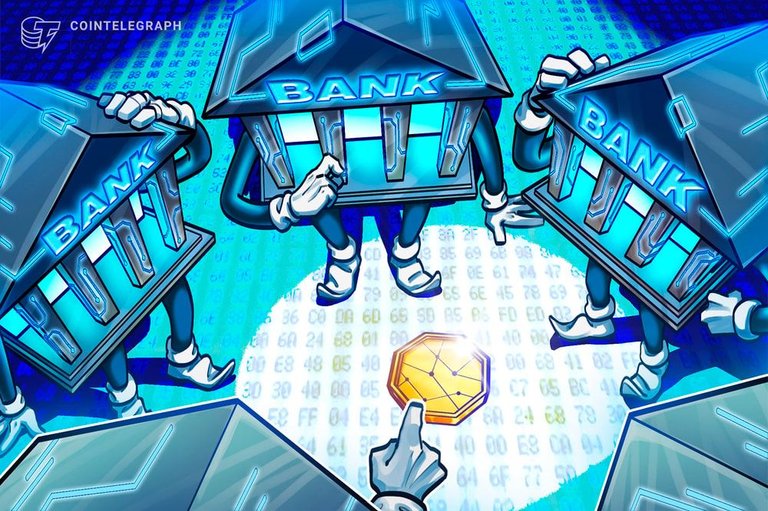The banks have no choice but to embrace crypto

The cryptocurrency ecosystem is in a crucial development phase and traditional investment firms and banks are moving a lot of things around to stay ahead.
This is something that has always been preached by enthusiasts that eventually, the banks will have to adjust to the newer tech, being blockchains or get left behind.
Most old timers understand the relationship the banks have had with cryptocurrency. For the big players, the technology has always been a threat to their business, while the smaller players generally saw it as an opportunity.
But of course, regulations could not have the small banks being incentivized to facilitate onboarding people onto a technology where the government's control would be lost, so it's been shut off, especially where it was very much needed.
The big players, though, leaned towards private alternatives to what crypto blockchains offered. Private blockchains however weren't ever going to be able to compete with public chains because they generally were no different from the private systems that already powered the banks.
Most people can't name any private blockchains and the few that can, don't know any more than they just exist somewhere under these institutions.
The adoption is in-house and generally not worth very much in the grand scheme of things.
But misunderstanding what crypto is aimed to achieve is what brought about this wasteful investment but things are changing. Some institutions are launching public chains and others are building interoperability between their private chains and the public networks.
Blockchains were meant to connect the world's economies just as social media made global interactions possible. The communication layer is now moving to money, setting the stage for capital to flow through global economies like a Facebook message.
Of course, this reality generally means less government and institutional control, but it's inevitable. Yet, it does not mean that the banks can do business, nor does it mean that they can't build strategic advantages in the industry, it just means that there's going to be heightened transparency and that means more risks as unethical practices can be discovered and challenged more easily.
From years of criticism from the CEO of JP Morgan Chase, to actively developing to connect to this ecosystem, this is evidence that the banks have no choice.
RWAs: Kinexys by J.P. Morgan completed test DvP transaction
JP Morgan will now allow its users to buy Bitcoin, without the bank being a custodian, said the CEO Jamie Dimon.
Has Jamie's opinion on crypto changed?
Reports on the matter highlights that the CEO maintains his negative stance on buying Bitcoin and generally cryptocurrencies but acknowledges the right users have to do so if they please.
“I don’t think you should smoke, but I defend your right to smoke. I defend your right to buy Bitcoin,” he said. — Cointelegraph report
This, however, is not the news people should be paying attention to. Everyone is evidently fixated on things that will make numbers go up for Bitcoin whilst there's so much more to care about.
Tokenization of real world assets for one, is the single most important thing right now because it leads to an influx of capital moving to this ecosystem. But before I expand on what capital flow I mean, here's what's new:
Chainlink, the standard for onchain finance, Kinexys by J.P. Morgan, the financial services firm's blockchain business unit, and Ondo Finance, the leading name in real-world asset tokenization, announced today the successful completion of a cross-chain Delivery versus Payment (DvP) test transaction. The successful transaction utilized blockchain deposit accounts on Kinexys Digital Payments' permissioned network for payment settlement, Ondo Chain's next-generation Layer 1 blockchain purpose-built to scale the tokenization of real-world assets, Ondo's flagship tokenized U.S. Treasuries Fund (OUSG), and Chainlink's secure cross-chain orchestration infrastructure. — PRnewswire
What's DvP and why does it matter?
Delivery versus Payment (DvP) is a settlement mechanism used in financial transactions—especially in securities trading—where the delivery of securities (like stocks or bonds) occurs only if payment is made simultaneously. It's a way to reduce counterparty risk. — GPT
That should mean that stocks and bonds trading through on-chain systems is coming for JP Morgan clients.
Although JP Morgan is doing this on a permissioned network, it's nonetheless building an onboarding rail for real world assets on Ondo, which is a hybrid of permissioned + permissionless chains.
Considering that we are in early development stages, this is all OK as the institutions and the banks general will believe that they can keep the control.
The reality is that eventually, things like company stocks will just be tokens on-chain with zero off-chain states and most other real world assets will have smooth integrations that demand zero permissioned systems.
How can anyone be sure that this will in fact happen?
This is where I'll circle back to the earlier mentioned capital flow into the ecosystem. One may generally think I was referring to capital investments into the tokenized RWAs but I was really referring to development capitals and human capital.
With more institutional adoption and effective exposure, the ecosystem grows in relevance and more investors become willing to bet on products and business developers building in the space.
Speaking of developers, it's not news that there's very few people(developers) working on crypto projects and this is expected to change soon. Human capital is going to grow at an astounding rate and this will inevitably lead to better products and services being built and many will be aligned with the fundamental values of cryptocurrencies, ensuring a sovereign future for decentralized economies.
Posted Using INLEO
https://www.reddit.com/r/CryptoCurrency/comments/1krlidg/the_banks_have_no_choice_but_to_embrace_crypto/
This post has been shared on Reddit by @rose98734 through the HivePosh initiative.